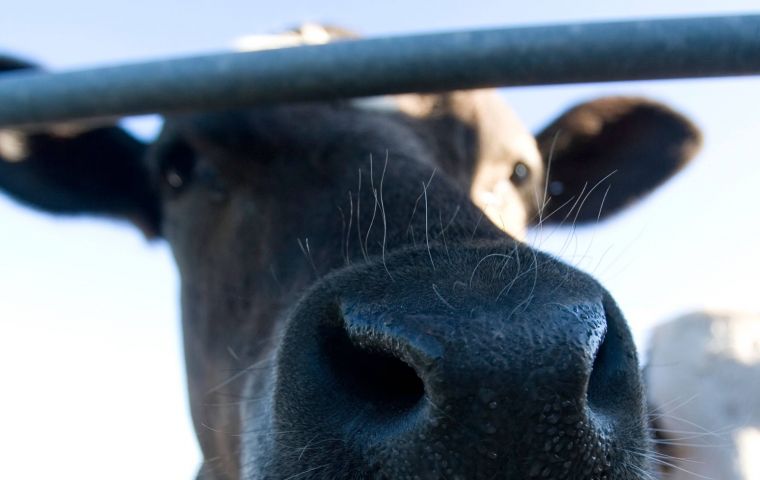MercoPress. South Atlantic News Agency
A case of classical 'mad cow' (BSE) confirmed in a farm in Scotland
 The case was identified as a result of routine surveillance and stringent control measures, the Animal and Plant Health Agency (APHA) said.
The case was identified as a result of routine surveillance and stringent control measures, the Animal and Plant Health Agency (APHA) said. A case of classical bovine spongiform encephalopathy (BSE), 'mad cow' has been confirmed on a farm in Ayrshire, Scotland, with movement restrictions in place on four farms. The case was identified as a result of routine surveillance and stringent control measures, the Animal and Plant Health Agency (APHA) said.
Precautionary movement restrictions have been put in place at impacted farm, which covers animals which have been in contact with the case.
Restrictions have also been put in place at three further farms – the farm of the animal’s origin and two more holdings where animals that have had access to the same feed are.
Further investigations to identify the origin of the disease are ongoing, APHA said, adding that the animal did not enter the human food chain.
In the 1990s, millions of cattle were culled across the UK during a classical BSE epidemic, linked to cattle eating rendered animal products contaminated with the BSE agent. Due to a ban in 1996 on animal proteins in feed for farm animals, cases of classical BSE are now rare, but cases do still occasionally occur.
Agriculture Minister Jim Fairlie said the Scottish government and APHA took 'swift and robust action' to protect the agriculture sector.
“The fact we identified this isolated case so quickly is proof that our surveillance system for detecting this type of disease is working effectively,“ he added.
“I want to thank the animal’s owner for their diligence. Their decisive action has allowed us to identify and isolate the case at speed which has minimized its impact on the wider industry.”
Whilst the disease is not directly transmitted from animal to animal, the cow's cohorts, including offspring, have been traced and isolated, and will be destroyed, APHA confirmed.
In addition to the measures in place for fallen stock and animal feed, there is a strict control regime to protect consumers.
This includes the removal of specified risk material such as the spinal column, brain and skull from carcasses destined for human consumption.
Chief Veterinary Officer Sheila Voas said the fast detection of this case was “proof that our surveillance system is doing its job”.
“We are working closely with the Animal and Plant Health Agency, and other partners to identify where the disease came from,“ she explained.
“I want to reassure both farmers and the public that the risk associated with this isolated case is minimal. But, if any farmers are concerned, I would urge them to seek veterinary advice.”
Food Standards Scotland has confirmed there is no risk to human health as a result of this isolated case. BSE is a notifiable animal disease, which must be immediately reported to the Defra Rural Services Helpline on 03000 200 301. Failure to report BSE is an offence.




Top Comments
Disclaimer & comment rulesCommenting for this story is now closed.
If you have a Facebook account, become a fan and comment on our Facebook Page!